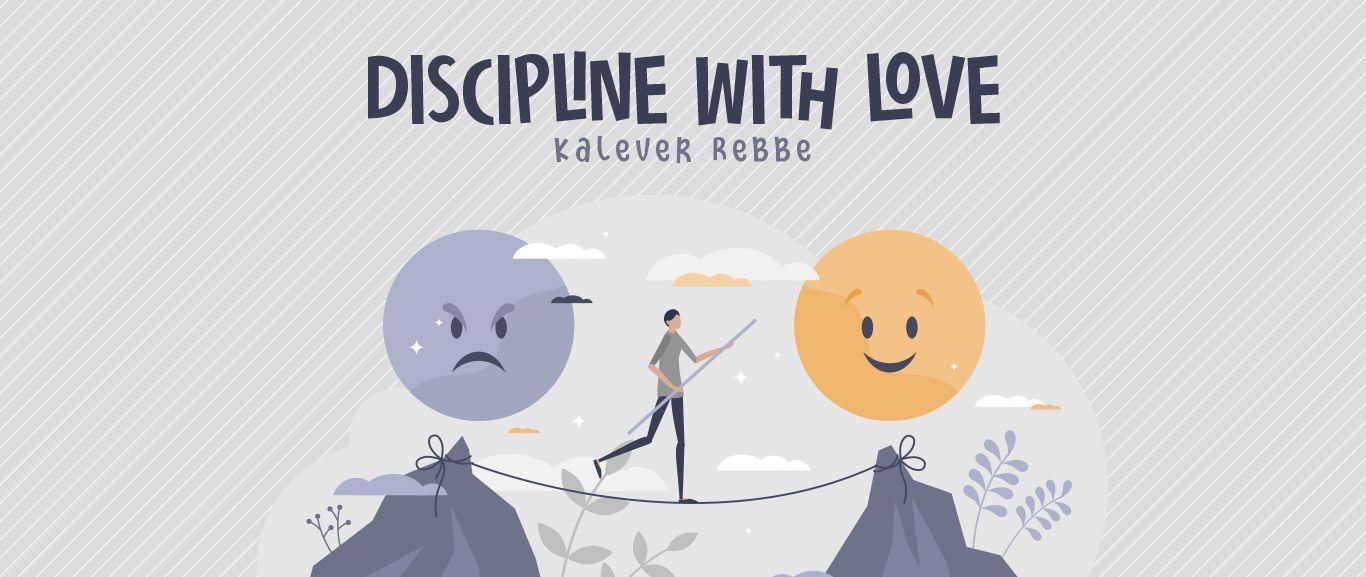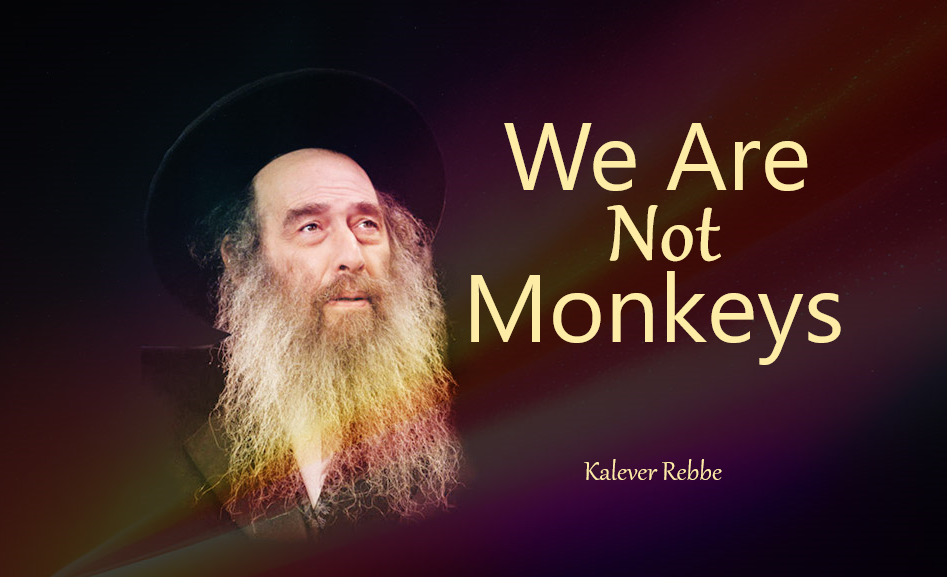
Discipline with Love
Let us never forget that every one of us is a precious and cherished child of the King of Kings. Some behaviors are simply beneath our lofty stature!

Misguided Teacher
R’ Ephraim Zalman Margulies, zt”l, had a son-in-law who was a grandson of R’ Pinchas Horowitz, the author of the Haflah. The family was very close and R’ Ephraim would regularly visit his son-in-law and his grandchildren. One day, a grandson came home from school crying. His grandfather, concerned, asked what was bothering the boy.
“Today, my teacher called me a sheikitz (Yiddish for “abomination”),” the boy answered.
R’ Ephraim decided to speak to the teacher. When he found the teacher, he asked, “Why would you call my grandson a sheikitz? ”
“Despite my best efforts, your grandson isn’t interested in learning Torah. So, I called him a sheikitz to inspire him to change his behavior and recommit himself to learning.”
“You couldn’t find any other words to bring my grandson back to learning Torah other than sheikitz? You had an infinitely more powerful message: you are the grandson of the Haflah and this behavior is beneath someone like you!”
You are Princes
Whenever you try to guide a yid back to Torah and mitzvot, it is imperative that you use words that are warm, encouraging, and rooted in genuine concern for that person’s spiritual well-being. You need an approach that will draw them close, not push them away.
The prophet in Hoshea (2:1) said, “… and it will happen in the place [of their exile] where it was said to them, “You are not my people.” It will be said to them, “Children of the living God.” The tsaddikim explain that this posuk is teaching a fundamental lesson in education. “In place” of using harsh words like “You are not my people,” use words of encouragement and positivity like “You are Children of the living God.”
You need to build yidden up, focusing on their positive attributes, what makes them special. By focusing on what makes them unique, they will understand that certain behaviors are simply beneath them.
The King’s Discipline
We see this same idea regarding how David HaMelech educated his children:
The posuk says in Malachim I (1:6): All his days his father never saddened him saying, “Why have you done this?”
How could one think that David HaMelech never had to discipline his children?!
Tsaddikim explained that obviously David HaMelech educated and guided his children. However, the posuk is teaching how he did that. It describes his approach. David HaMelech never made his children feel bad about themselves; they were never “saddened.” Instead, he would frame the rebuke in positive terms: how could someone as special as you, my child, a prince, behave in such a manner? They would listen, accept and understand that certain behaviors were simple beneath their stature, and they would return to a life of Torah and mitzvot.
The Gemara relates (Bava Metzia 85a) that after the passing of R’ Eliezar ben R’ Shimon, his son started drifting away from Torah and mitzvot. When Rebsh HaKodesh heard this, he went to see the son. He explained to him his lineage, showing great respect to the boy. He gave him a garment made of gold and called him Rebbe. The son promised to never return to his wayward ways and he recommitted himself to Torah and mitzvot.
Rebbe built him up with positivity. He focused on how incredibly precious he was; how important. The son understood and changed his ways.
We Are All Princes
The pasuk in Mishlei (3:11) says: My child, do not despise Hashem’s discipline (mussar)… The Slonimer Rebbes explained that the “discipline”, the mussar that Hashem gives the yidden is “My child.” He reminds them that they are His children, the “children of the living God”. They are princes, royalty, and, therefore, must conduct themselves accordingly. Subsequently, they will despise any behaviors that are unfitting for royalty such as themselves.
A yid must always remember that he is the prince of the King of Kings, a precious and cherished child. As such, certain behaviors are truly beneath their stature.
R’ Shlomo of Karlin, zt”l, taught that the greatest damage the Yetzer Harah can do to a yid is to cause him to forget that he is a prince, the child of the King of Kings, of Hashem.
The Seforim HaKedoshim explain that the name ישראל (Yisroel) is the combination of two words: לי ראש – “my head.” A yid must realize that he is the “head”, the main purpose of creation. This entire world exists for him and his Avodat Hashem. As Rashi explains in Bereshit (1:1) that Hashem created the entire world for the sake of Torah and B’nei Yisroel, both of which are referred to as “in the beginning” elsewhere in Tanach.
Therefore, when a person’s behaviors are not aligned with Torah and mitzvot, he needs to remind himself of his importance and of his stature in the universe. He needs to realize that these actions are beneath him.
Focus on the Positive
Therefore, even when it is necessary to give another person mussar, to discipline and guide them, it should be delivered with love, joy, and positive encouragement. For example, you need to say, “This behavior is not fitting for someone with your talents, for someone as special as you.” This approach to mussar and discipline will ensure that you fulfill the posuk that says (Kohelet 9:17), The words of the wise are heard [when spoken] softly…
The Shlah HaKodesh ( Devarim 19) explains the posuk in Mishlei (9:8) Reprove not a scorner lest he hate you; reprove a wise man and he will love you. You should not reprimand a person by saying, “Why are you doing this?” That approach will be rejected and he will “hate you.” Rather, explain that he is a “wise man“, someone unique and precious. Focus on the positive, and he will inevitably understand that certain behaviors are beneath him. In doing so, he “will love you“; he will accept your guidance and advice.
Perhaps this can explain that teaching of Chazal in Pirkei Avot (1:12), Hillel would say: Be of the disciples of Aaron—a lover of peace, a pursuer of peace, one who loves the creatures and draws them close to Torah. These ideas go hand in hand. If you love other people, if you genuinely care about them, then you can draw them back to the good path, a life of Torah and mitzvot. When they see that you are concerned for their well-being, they will be open to receiving your guidance.
The Lesson for Tisha B’Av
Chazal seems to offer contradictory explanations for the destruction of the second Beis HaMikdash:
On one hand, they teach (Yuma 9b) that the Beis HaMikdash was destroyed because there was sinat chinam, baseless hatred, amongst the yidden. On the other hand, they explain (Shabbos 119b) that the Beis HaMikdash was destroyed because they didn’t reprimand one another.
Which is it?
Based on what we have explained here, we can understand that these two teachings are one and the same. Since there was baseless hatred amongst the yidden they were unable to reprimand one another in a loving, caring and positive approach. Therefore, the mussar could not be accepted and their actions not rectified. They were lacking the genuine love for one another that enables the words of mussar to be received and accepted.
During these days when we mourn the destruction of the Temple and daven for the final redemption, we must strengthen this idea in our lives. We need to learn to draw yidden closer to Hashem out of love; with words that are warm and caring. We need to focus on the incredible attributes of each yid and not allow our biases to interfere. By guiding yidden to Torah and mitzvot with love and positivity, we will merit the arrival of Mashiach and the final redemption speedily in our days.
***
The Kalever Rebbe is the seventh Rebbe of the Kaalov Chasidic dynasty, begun by his ancestor who was born to his previously childless parents after receiving a blessing from the Baal Shem Tov zy”a, and later learned under the Maggid of Mezeritch zt”l. The Rebbe has been involved in outreach for more than 30 years, and writes weekly emails on understanding current issues through the Torah. You can sign up at www.kaalov.org.












Tell us what you think!
Thank you for your comment!
It will be published after approval by the Editor.